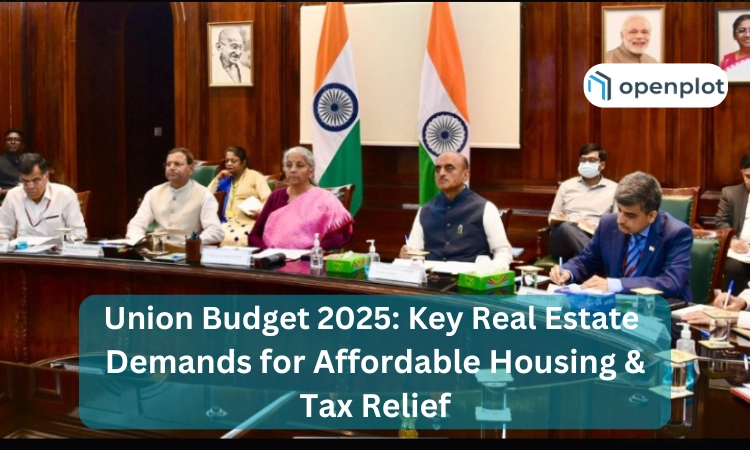Introduction
As the Union Budget 2025 approaches, the real estate sector is eagerly anticipating key policy reforms and incentives to drive growth and affordability. With rising property prices and evolving market dynamics, industry stakeholders are calling for crucial interventions. Including an increase in the affordable housing price cap, reinstatement of tax deductions, and rationalization of GST input credits to ease financial burdens on developers and homebuyers alike.

Table of Contents
- Enhancement of the Affordable Housing Limit
- Tax Reliefs for Homebuyers
- Extension of Section 80EEA for First-Time Homebuyers
- GST Reforms for Under-Construction Properties
- Relaxation in Long-Term Capital Gains (LTCG) Tax
- Boosting REITs and Rental Housing Incentives
- Frequently Asked Questions
According to Grant Thornton Bharat’s Pre-Budget 2025 expectations survey. These measures could boost housing demand, reduce project costs, and enhance accessibility for buyers. As Finance Minister Nirmala Sitharaman prepares to unveil the budget, all eyes are on whether the government will introduce the much-needed reforms to revitalize the sector.
Enhancement of the Affordable Housing Limit
One of the major demands from the real estate sector is an increase in the price cap for affordable housing under Section 80IBA of the Income Tax Act. Currently, affordable housing is defined as:
- ₹45 lakh in metro cities
- ₹30 lakh in non-metro regions
Developers are urging the government to revise these limits to better reflect market realities. An upward revision to ₹60–75 lakh in metros and ₹40–50 lakh in non-metros would make more homebuyers eligible for benefits under the Pradhan Mantri Awas Yojana (PMAY) and other subsidy schemes.
Tax Reliefs for Homebuyers
Homebuyers are advocating for increased tax deductions on home loan interest payments. Currently, under Section 24(b) of the Income Tax Act, a deduction of up to ₹2 lakh is allowed on interest paid on home loans for self-occupied properties. Stakeholders suggest raising this limit to ₹5 lakh to provide substantial relief and encourage homeownership.
Extension of Section 80EEA for First-Time Homebuyers
One of the key demands from the real estate sector is the revival and extension of Section 80EEA of the Income Tax Act. Which previously provided an additional tax deduction of ₹1.5 lakh on home loan interest for first-time homebuyers purchasing affordable housing. This benefit was available over and above the ₹2 lakh deduction under Section 24(b) but expired on March 31, 2022.
Industry experts argue that reinstating this deduction would make homeownership more accessible, especially for the middle-income segment, and drive demand in the affordable housing sector. Given the rising property prices, there is also a demand to increase the price cap for eligible properties under this section, ensuring more buyers can avail of the benefit.
GST Reforms for Under-Construction Properties
Currently, under-construction properties attract 5% GST without input tax credit (ITC), making them costlier than ready-to-move-in homes (which have no GST). Developers are advocating for:
- A reduction in GST on under-construction homes to 3%
- Reinstating ITC benefits to lower construction costs
Such reforms could bring price stability and improve buyer sentiment in the under-construction property market.
Relaxation in Long-Term Capital Gains (LTCG) Tax
Real estate stakeholders are seeking relief in LTCG taxation, particularly:
- Lowering the holding period from 24 months to 12 months to qualify for long-term gains
- Reducing the current LTCG tax rate from 20%
- Expanding Section 54 exemptions for reinvestment in multiple properties
- These changes could encourage more property transactions and unlock capital for reinvestment in the sector.
Boosting REITs and Rental Housing Incentives
With the increasing adoption of Real Estate Investment Trusts (REITs) in India, industry leaders are demanding. As Union Budget 2025 nears, real estate stakeholders are calling on the government to implement crucial reforms, especially in GST rationalization and tax incentives for homebuyers. Industry leaders believe that these measures will not only boost housing demand but also enhance affordability and contribute to economic growth.
- Reduction in dividend distribution tax on REIT earnings
- Tax exemptions for retail investors in REITs
- Incentives for rental housing projects to improve urban accommodation availability
Conclusion
The real estate sector is looking to Union Budget 2025 to provide the necessary reforms that will improve housing affordability. Stimulate market demand and ease the financial burden on developers and homeowners alike. The proposed changes range from tax incentives to higher affordable housing limits. Could play a crucial role in making housing more accessible and affordable for millions of Indians. For more information, visit openplot.
Frequently Asked Questions
Q. What tax benefits are currently available for homebuyers?
A. As of now, homebuyers can avail a deduction of up to ₹2 lakh on interest paid on home loans for self-occupied properties under Section 24(b) of the Income Tax Act. Additionally, principal repayment of up to ₹1.5 lakh is eligible for deduction under Section 80C.
Q. How does the current definition of affordable housing impact homebuyers?
A. The existing price cap of ₹45 lakh for affordable housing limits the availability of such units, especially in metro cities where property prices are higher. Raising the cap would enable more buyers to qualify for benefits under various housing schemes.
Q. Why is there a demand for GST reforms on under-construction properties?
A. The 5% GST on under-construction properties without ITC makes them costlier compared to ready-to-move-in homes. Reforming GST rates and allowing ITC can reduce the financial burden on buyers and promote the sale of under-construction units.
Q. What are the expected benefits of promoting green housing?
A. Encouraging green housing through tax incentives can lead to energy-efficient homes, reduced utility costs for residents, and a lower environmental footprint, contributing to sustainable development goals.
Q. How can the government support rental housing?
A. The government can introduce tax exemptions or subsidies for developers to construct rental housing projects, thereby increasing the availability of affordable rental options in urban areas.